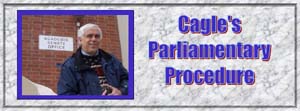
Link to Cagle's Questions page and index.
Link to Cagle's Parliamentary Procedure page.
I was concerned that I wasn't going to get the motions on the floor in the right order.
Of course, I couldn't find my pocket copy of Robert's Rules.
As usual, I found the answer on the Net and on your page. Your chart of motions is just what I need.
Thanks for taking the time to put this page together for those of us who need the help.
Thank you for the nice note, Nancy.
A small point: If you find the pocket copy of Robert's Rules, be sure it is the same edition as the organization's parliamentary authority. The standard today is generally Robert's Rules of Order Newly Revised, which is different from the 1893 edition that is usually in paperback in bookstores. There are differences which could be important in some organizations, particularly those which relate to politics or to money.
But it was nice to hear from you.
Sturgis is a well-respected parliamentary authority, especially suited to smaller, informal organizations, in contrast to Robert's Rules of Order (in its various manifestations) which was designed to run a meeting as large as the Democratic National Convention. Sturgis was much shorter, simpler, and easy to use. In general, with a few exceptions, it is very similar to Robert's in how the rules work and the various details. For example, whereas in Robert's a motion to reconsider could be made only by someone who had voted on the prevailing side, Stugis's rule held that anyone could make the motion (since anyone could change their vote to do so when the handwriting was on the wall). I've always liked Sturgis, even if it is less comprehensive than Robert's. Alice Sturgis also published a textbook called Learning Parliamentary Procedure, and you could probably find it in the library.
The American Institute of Parliamentarians (a national organization of parliamentarians) recently revised and updated Sturgis; AIP is essentially the author of the version of Sturgis your association has adopted. The AIP has an internet site at http://www.connix.com/~aip/ and I believe it contains a list of seminars.
Demeter's Manual is an outstanding work. Among other things, he incorporates a great many court decisions and "law" into the manual than do most other parliamentary procedure works. Its disadvantage is how comprehensive it is (rather more than most organizations need, which was an argument for Sturgis' Standard Code of Parliamentary Procedure) and, in my opinion, a certain disorganization in the presentation of the material--there is so much of it. I use it frequently as a reference.
Your UFW post should get a couple of copies, at least one, for it to use. Minimally, your president and your parliamentarian should each have a copy.
I have always been amazed that really huge organizations will adopt a parliamentary authority, mandate its use, and so forth, when no one in the organization has a copy and sometimes no one has ever read it. When I first became Parliamentarian at Fresno State in 1970, I was amazed that no only didn't the Academic Senate office have a copy of Robert's Rules of Order Newly Revised, but there weren't copies in the Library nor in the bookstore.
I checked today with Fresno State's bookstore and can tell you that the book is still in print, so you should be able to order a copy. Here is the reference for it:
Demeter, George. (1969). Demeter's manual of parliamentary law and procedure: for the legal conduct of business in all deliberative assemblies. Boston: Little, Brown.The Library of Congress number in Fresno State's library is ref / JF515 .D4 1969. Things have improved here, anyway.
Return to Cagle's Questions page and index.
Link to Cagle's Parliamentary Procedure page.